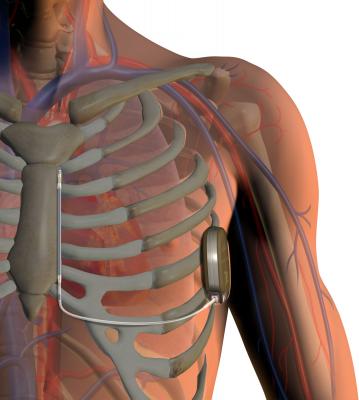
November 12, 2012 — Boston Scientific Corp. and the University of Rochester Medical Center presented positive results from the Multicenter Automatic Defibrillator Implantation Trial-Reduce Inappropriate Therapy (MADIT-RIT) clinical trial that demonstrated improved programming of Boston Scientific dual-chamber implantable cardioverter defibrillator (ICD) or cardiac resynchronization therapy defibrillator (CRT-D) heart devices can reduce inappropriate therapy and risk of death. MADIT-RIT is a prospective, randomized, three-arm trial comparing conventional programming with two alternative settings: a high-rate therapy arm and a duration-delay arm. The study was designed to determine if alternate programming could reduce the occurrence of inappropriate therapy in primary prevention patients. The results were presented at the 2012 American Heart Association scientific sessions in Los Angeles. The full MADIT-RIT results were published in the New England Journal of Medicine.
When compared to conventional programming, significant reduction of inappropriate therapy was seen in both the high-rate and duration-delay therapy arms [79 and 76 percent, respectively (p<0.001 in both arms)]. In the high-rate therapy arm, there was a significant 55 percent reduction of the risk of death (p=0.01) compared to conventional programming. While not statistically significant, the risk of mortality was reduced in the duration-delay therapy arm by 44 percent (p=0.06).
“MADIT-RIT shows that improved programming can dramatically reduce inappropriate therapies and increase survival when compared to conventional device programming,” said Kenneth Stein, M.D., chief medical officer of the Cardiac Rhythm Management Group at Boston Scientific. “This will have immediate clinical significance for physicians who implant and manage these devices. While previous studies have shown that ICDs are very effective in preventing sudden cardiac death, this study demonstrates that substantially more lives can be saved and many unnecessary and inappropriate therapies can be avoided with improved device programming.”
Both shock therapy and anti-tachycardia pacing (ATP) therapy were evaluated in the trial. ICD and CRT-D devices constantly monitor the rate and rhythm of the heart and are designed to deliver electric shocks in response to very fast and potentially fatal heart rhythms. Shocks are highly effective in returning the heart to a normal rhythm and provide life-saving therapy to patients who develop ventricular arrhythmias. Anti-tachycardia pacing is effective in converting some types of fast heart rhythms. The devices may be programmed to deliver ATP before the shock, and if successful, a shock can be avoided.
The MADIT-RIT clinical trial was sponsored exclusively by Boston Scientific. MADIT-RIT evaluated 1,500 primary prevention patients with an ICD or CRT-D at 98 centers in 15 countries, including the United States, Europe, Canada, Israel and Japan. The trial was conducted under principal investigator Arthur J. Moss, M.D., professor of medicine at the University of Rochester Medical Center.
“I have been the principal investigator of a series of MADIT trials that have improved survival of high-risk heart patients during the past 20 years,” said Moss. “I am pleased to report on our latest 1,500-patient MADIT study in which we have significantly improved the effectiveness of ICDs by reducing inappropriate electrical stimulation of the heart by up to nearly 80 percent while further increasing patient survival by 55 percent. These life-saving findings from our current study add an important new chapter in the evolution of the ICD to improve the treatment of patients with advanced heart disease.”
MADIT-RIT is an important continuation of Boston Scientific’s exclusive sponsorship of landmark clinical trials. More than 80 percent of U.S. patients who receive an ICD or CRT-D were first indicated for this therapy by a clinical trial sponsored by Boston Scientific or its predecessor companies. Boston Scientific estimates that 75,000 lives have been saved worldwide by implantable defibrillators over the past five years.
For more information: www.bostonscientific.com


 January 05, 2026
January 05, 2026 









